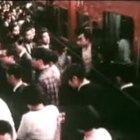- Toolkits
- Are You Ready to Talk?
- Beyond the Line
- Blocking Gender Bias
- Edgy Veggies
- First-Gen Ascend
- Fishbowl Discussions
- Measuring Mobility
- Peaceful Politics
- Plot the Me You Want to Be
- RaceWorks
- Rethinking Stress
- Space Reface
- Team Up Against Prejudice
- United States of Immigrants
- Kit Companion: Map Your Identities
- Kit Companion: LARA
- Collections
- Action Areas
- About

Under Pressure? How a Marine, Professor, and Chinese Villager View Stress
Stories From the Field
Under Pressure? How a Marine, Professor, and Chinese Villager View Stress
As Queen and David Bowie point out in the 1981 hit song “Under Pressure,” modern life can often feel like it is “pushing down on” us in myriad ways that make it easy to see stress as a villain.
Yet viewing stress as an ally rather than enemy — within reason — may help transform it into a tool for focusing, energizing, and fortifying ourselves, according to research informing this toolkit.
If shifting your mindset seems easier said than done, don’t miss this toolkit’s instructions for making the journey. For some perspective on the process, read on to see how others have reacted to life’s slings and arrows:
The Marine Corps veteran: Andrew Wittman saw combat in Panama and Iraq, served as a police officer in South Carolina, and protected American political leaders as a United States Capitol Police agent. A Business Insider article shared his views on stress:
“I always call stress my rocket fuel. For me, it always makes me better, it makes me perform better. I can’t get enough of it. I’m like a stress junkie.”
He says that instead of allowing stress to hinder you, it’s better to acknowledge how you feel and work through it — or even harness the emotion to help you focus and strategize.
Wittman’s top tip for beating stress is to seek out non-threatening situations that you find stressful.
The Chinese villager: John Day, a cardiologist, traveled to Bapan, China, to learn why it has so many centenarian and healthy elderly people. He met a man picking vegetables in a field and learned something about perceived stress when Day commented on the difficulty of the labor. The villager, Li Yu, said:
“It is hard work. By the time I am back at my home, though, I don’t think about how hard it is. I am always feeling satisfied about what I have accomplished during the day.”
The professor: Dana Becker, a professor of social work at Bryn Mawr, wrote the book One Nation Under Stress: The Trouble With Stress as an Idea. She “argues that Americans are obsessed with curing stress, rather than identifying and addressing the forces that cause it” in an an NPR interview. Here are some other perspectives from Becker:
“If we think back to the middle of the 19th century, George Beard, who coined the term neurasthenia, was really the first in this country to talk about American nervousness. … He and folks who came after him had the idea that … stress was what was outside, you know, that the conditions were more important to talk about. … Now it seems that we’ve shifted, really brought that outside in. So we become preoccupied with risks to our health and our mental health, our psyches, and we lose sight of the conditions that really create the stress in the first place.”
“Having read a lot of what the media has had to say about stress, it feels like we’re using the term to cover just about everything, from a hangnail to the war on terror. But the way that we react to stress also affects the way we are in the world, the way we act, the kinds of options that we have for how to behave.”
What stories do you have about stress and rethinking it? Let us know using the form on the right side of the Stories From the Field page, and we may contact you about sharing your insights on this website.


